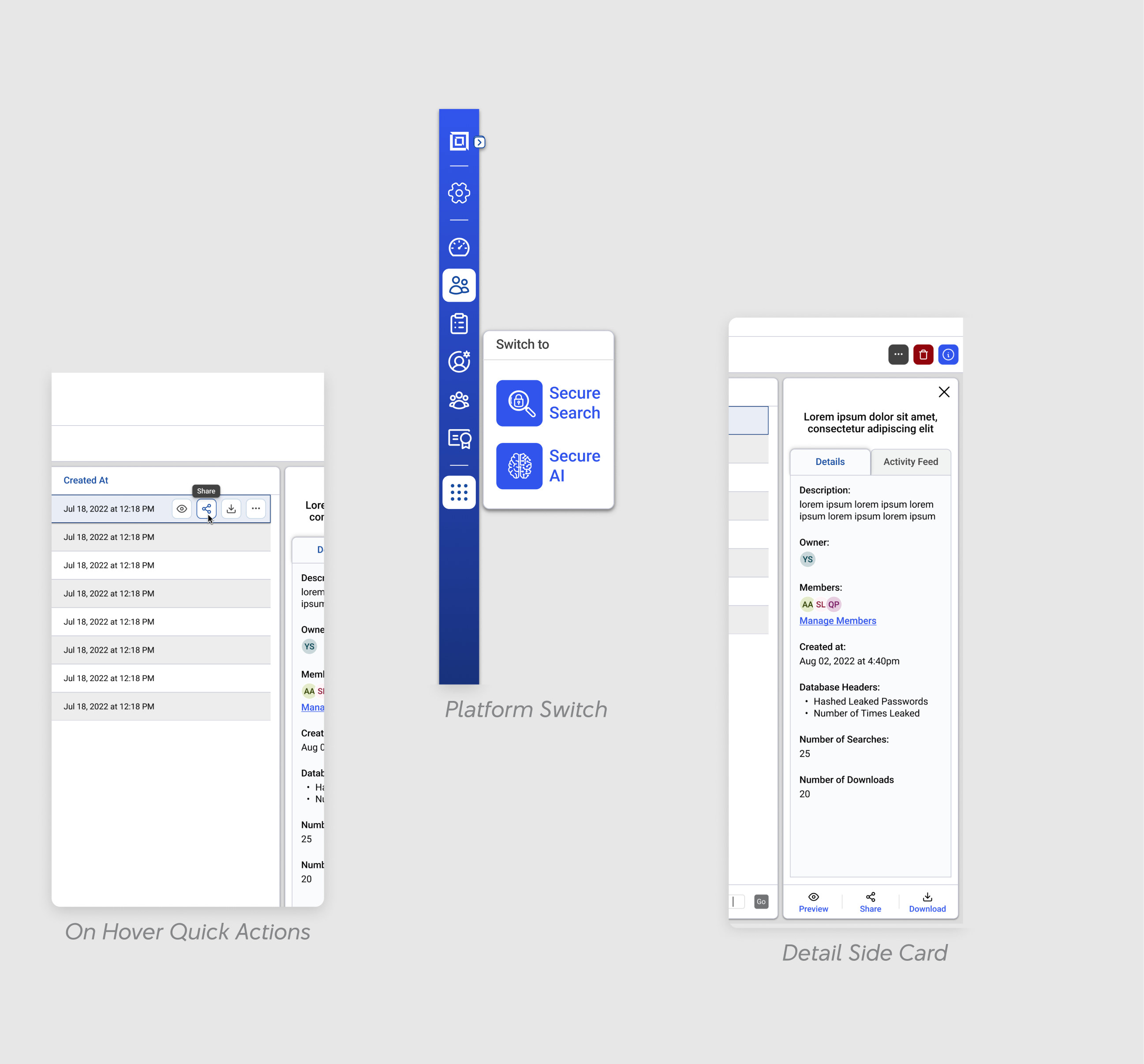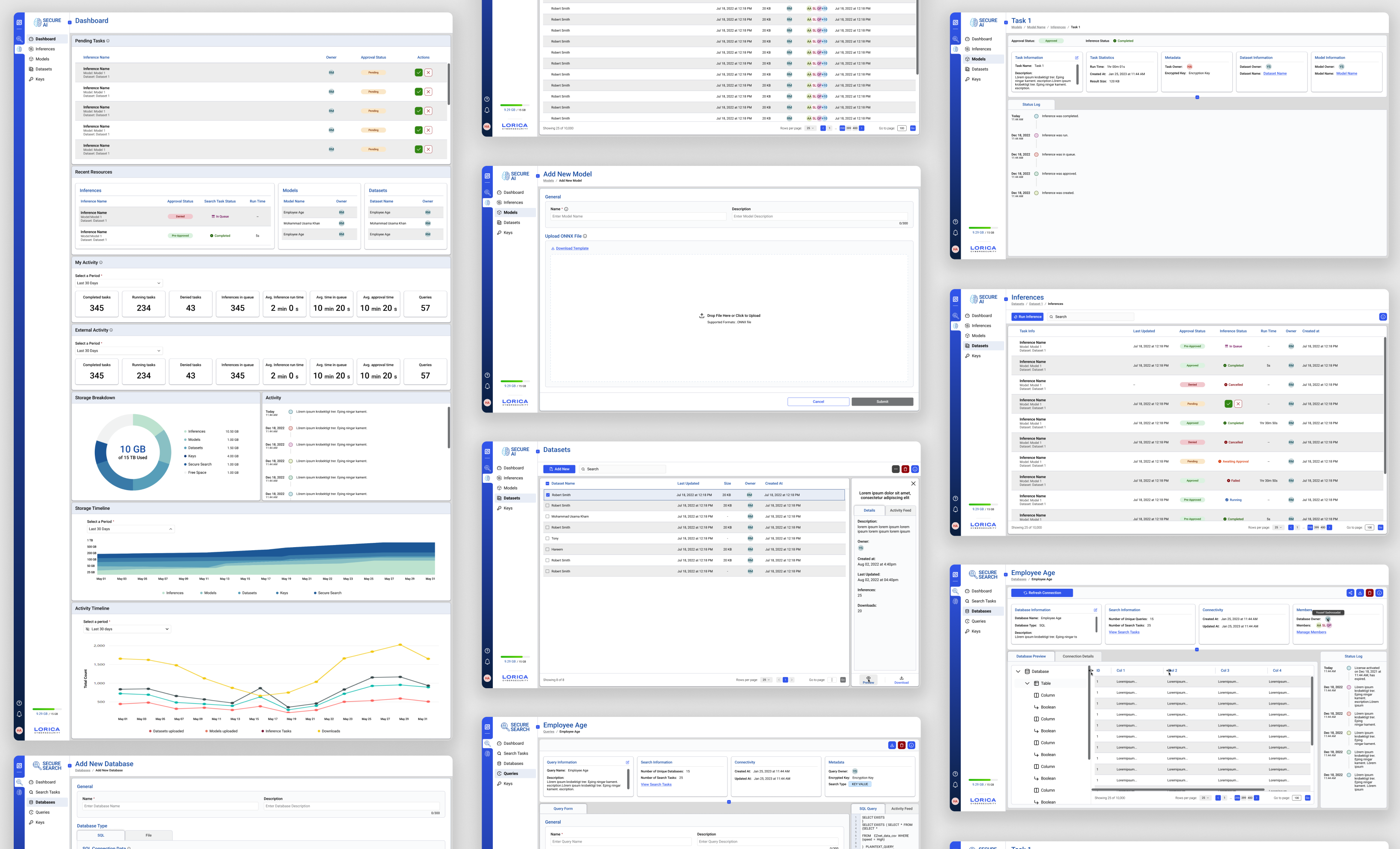AI and Analytics Empowered by Technology
Lorica Private Pursuit is a secure file sharing enterprise web application. With their high-performing realizations of advanced cryptography, they are able to eliminate vulnerabilities throughout data lifecycle, private and secure computation. This is a modern technical solution to define a new level of security and privacy for enterprise data.
Lorica had a clear vision for their product. To ensure alignment with their goals, we began the project with a comprehensive design audit of their previous designs, identifying areas for improvement. The audit revealed several key issues, such as misaligned elements that could create problems for developers during implementation, and inconsistencies in component states that could hinder the introduction of new features and limit Lorica's future expansion plans. To address these accessibility concerns, we ensured all elements complied with WCAG 2.2 standards.
How Might We create a secure file sharing web application that works seamlessly and intuitively with enterprise data to generate valuable insights and accelerate innovation?
Lorica approached us with a desire to revitalize their existing designs to accommodate a growing list of features. As these features expanded, maintaining a clear page hierarchy became very important. To achieve this, we strategically employed drawers and tabs for efficient content organization. Additionally, we ensured that crucial actions, such as delete functions, were visually emphasized to prevent them from being overlooked within the broader interface.
The unique functionalities of Lorica presented a challenge in translating their complex actions into clear and intuitive interactions for users. Since there weren't many open-source programs with similar features, we drew inspiration from various established platforms to create a familiar user experience. We looked to tools like Dropbox's table system for file organization, Google Admin for setting inferences, and project management platforms like Docusaurus, Monday, Box, Jira, and Duality for their intuitive interaction of elements. This approach ensured that even users encountering Lorica for the first time could navigate the platform with ease, leveraging familiar patterns from trusted applications.

Platform Features

Design Iterations
In the absence of a pre-existing design system, we established a foundation built on accessibility and user-friendliness. This system adheres to WCAG 2.2 compliance, ensuring an inclusive experience for all users. The initial color palette, relying solely on blue to evoke trust and security, was expanded with the introduction of a welcoming yellow accent. To further enhance approachability, we implemented rounded buttons and icons, while maintaining readability with a clear sans-serif font.

View Design System
During our process, we developed several potential user personas to understand the target audience's needs and behaviors. We then synthesized that information and gathered more specific insights. Using this data, we created an information architecture that underwent multiple iterations to ensure a clear and intuitive user journey. The current architecture, though simplified, represents the core structure of the platform. Finally, we moved into the wireframing phase, where we integrated the unique features requested by the client while considering usability, accessibility, and overall user experience.

System Admin
“I believe connectivity is key to security. Having the ability to oversee and track where everything is going is important in this age”
Goals & Needs

Data Scientist
“I am a big believer of security. I believe that from my work place to my home it is important to stay protected. While breaches may be rare, it’s better to be safe than sorry.”
Goals & Needs

Manager
“Me and my team really care about all of our clients and their information privacy. We strive to give them the best care possible. The key in this game is also speed.”
Goals & Needs

Information Architecture

Wireframes

MVP
Reflection
Working with Lorica was a challenging yet rewarding experience. I was faced with unfamiliar and complex terminology which stretched my knowledge base, but the experience has equipped me to take on future AI projects with confidence. In addition, we had constant line of communication with the developers which resulted with tremendous help on our side. We were able to communicate clearly on the design specifications such as running them through the design system and how the interaction should behave. The developers would also communicate what sort of functionalities could be done as well.
Overall, the client was very happy and satisfied as they were able to secure a contract from the government of Canada to evaluate its Private Pursuit platform alongside the Communications Security Establishment (CSE) for R&D use cases in Cyber Defense. Furthermore, they had an established identity and design system they are able to follow for any future expansions.
What’s Next?
Since we designed and developed this project side-by-side with the developers, our next steps would involve conducting usability testing and implement changes based on the user feedback.